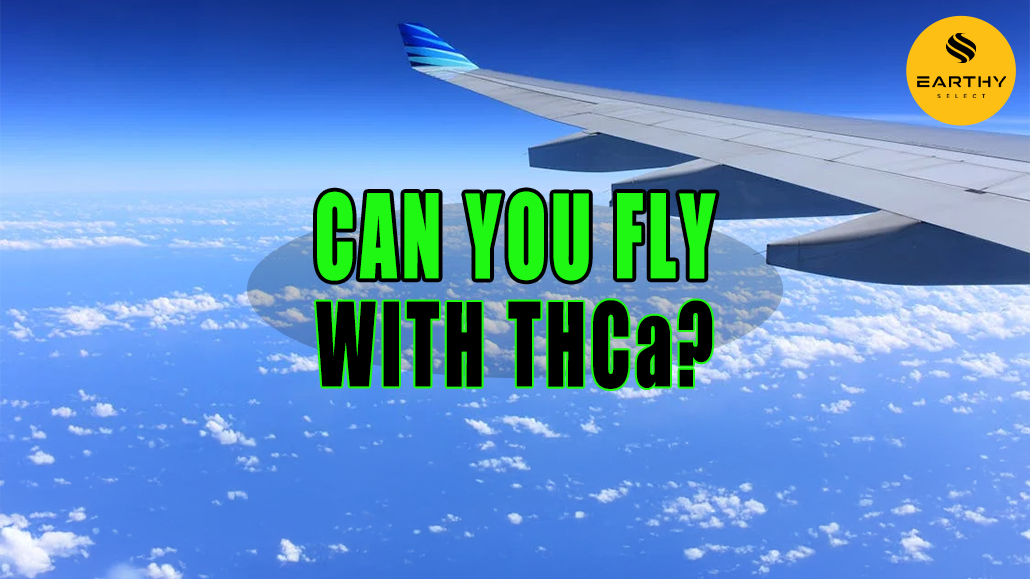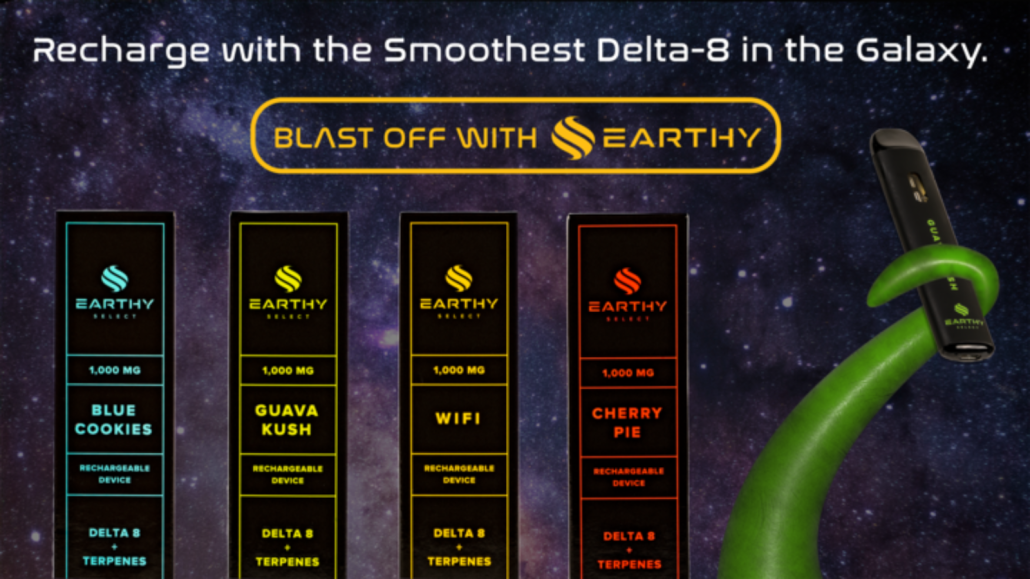Can You Bring THCa on a Flight? TSA Guidelines and State Laws
Key Takeaways
- THCa’s legality is complex due to federal guidelines, state laws, and TSA policies, creating a gray area for travelers.
- The 2018 Farm Bill allows hemp-derived THCa with less than 0.3% Delta-9 THC, but this doesn’t guarantee safe air travel.
- International travel with THCa is highly risky due to varying and often strict drug laws in different countries.
You’re not alone if you’re wondering whether your THCa products, such as Earthy Select Exotic Flower Buds, Prerolls, Live Rosin, Diamonds, or Bubble Hash, can be taken on a flight. Though the 2018 US Farm Bill legalized hemp-derived products containing less than 0.3% Delta-9 THC, which legal experts maintain includes THCa, traveling by air with such items is a nuanced issue. Even with Earthy Select’s dedication to providing high-quality, rigorously tested THCa Flower sourced from family farms in California and Colorado, navigating TSA regulations and state-specific laws can be challenging. We’re here to explore the issue in detail with you.
At Earthy Select, we prioritize safety, quality, and customer education, particularly when it comes to our customers’ well-being, which encompasses considerations related to air travel. While hemp-derived THCa occupies a unique position under federal law, there is still notable ambiguity when passing through TSA checkpoints or traveling across state lines with differing regulations. Thus, before considering packing THCa in your luggage, it’s worth noting the specific guidelines and potential risks involved to help ensure a smoother travel experience. Let’s examine the details to help you stay informed and prepared.
Flying With THCa: What Travelers Need to Know
Considering taking THCa on a plane? The matter is often complicated by the intersection of federal and state regulations. The TSA primarily focuses on aviation security rather than personal drug possession, though their policy indicates that suspected controlled substances, if discovered, must be reported to local law enforcement [1]. Moreover, state laws can differ significantly. For example, even if your hemp-derived THCa meets the federal threshold of less than 0.3% Delta-9 THC, this does not guarantee it will be recognized as legal at every location along your journey.
Thus, if you choose to travel with THCa, it’s prudent to take certain precautions. More specifically, keep the product in its original packaging and carry a certificate of analysis to verify the ingredients. Additionally, use discretion. For instance, utilize an odor-proof container and consider placing your THCa product in checked luggage, which may help reduce attention. However, it’s worth noting that random searches can occur at any time.
Ultimately, if you thoroughly research the laws of both your departure and arrival states before traveling with THCa, you’ll be better able to understand what you’re up against. Until clearer, more consistent guidance is available, traveling with THCa may carry inherent uncertainties that warrant careful consideration.
THCa Presents a Legal Gray Area
The legal status of THCa, or Tetrahydrocannabinolic acid, is often regarded as complex due to provisions in the 2018 US Farm Bill, which permits hemp-derived products with less than 0.3% Delta-9 THC on a dry weight basis [2]. Since THCa is not psychoactive until heated, some interpretations suggest it falls within this legal framework. However, the bill does not specifically address THCa, leaving its status somewhat unclear across state boundaries and under federal oversight.
At airports, where TSA operates under federal jurisdiction, marijuana is classified as a Schedule I substance under the Controlled Substances Act, and the distinction between THCa and THC may not always be recognized by agents [3]. This could potentially lead to complications if raw flower or related products are flagged during security screenings.
Additionally, federal agencies like the DEA have not provided definitive guidance on THCa, which may introduce further uncertainty even for naturally occurring, hemp-derived compounds. Until regulatory frameworks align more closely with cannabis science, those engaging with THCa might find themselves navigating a delicate balance between compliance and potential risk.
What Makes THCa Different from THC
Within the realm of cannabis, THCa is recognized as the non-psychoactive precursor to THC found in raw cannabis plants. Notably, THCa does not produce psychoactive effects unless it undergoes decarboxylation—a process involving heat—that converts it into THC [4].
Emerging research tentatively suggests that THCa may offer anti-inflammatory and neuroprotective properties, pointing to possible health benefits without the associated high [4]. While further studies are needed, the distinction between THCa and THC continues to fuel both legal discussions and health-related inquiries.
Federal Air Travel Laws and THCa Possession
When considering federal air travel regulations, carrying THCa can seem like a high-stakes game of guesswork. However, the TSA’s primary mission is to ensure aviation security, not to focus on cannabis derivatives. Even so, if something suspicious is identified during screening, they are required to notify local law enforcement [1]. This step can introduce potential complications if you find yourself carrying THCa products.
It’s important to remember that THCa, present in raw cannabis, often falls into a legal gray area. Though the 2018 Farm Bill allows hemp products with less than 0.3% Delta-9 THC, THCa is not explicitly mentioned, and TSA agents may not be equipped to differentiate between legal hemp derivatives and prohibited marijuana products [2]. As a result, if a product is mistaken for marijuana or tests positive for THC after heating, there could be legal implications, even with supporting lab documentation [5].
Though agents’ viewpoints may differ, federal law governs airports [6]. Therefore, even if you’re traveling from a state where cannabis is permitted, federal jurisdiction applies once you’re at the airport. Even so, experiences can vary widely—some travelers may pass through without issue, while others might encounter scrutiny over small quantities.
The TSA has noted that they do not actively search for drugs, but if something is found, it will be referred to law enforcement [1]. Consequently, traveling with THCa through airports may involve potential legal considerations, as the system might not always account for scientific distinctions between compounds.
In short, the TSA says they’re not hunting for drugs, but if they find something, they’ll pass it on. Therefore, carrying THCa through airports means risking it all – your freedom, time, and your stash. So, remember, just because science backs you up, that doesn’t always mean the system will.
State Laws That Affect Flying with THCa
Understanding the varied landscape of cannabis laws across the U.S. can be challenging when contemplating air travel with THCa products. For instance, each state has its own regulations, and while the 2018 Farm Bill provides some protection for hemp products with less than 0.3% Delta-9 THC, this does not necessarily ensure a seamless experience when crossing state lines [2]. In states like California or Colorado, where cannabis laws are more permissive, there might be a sense of reassurance, though federal jurisdiction at airports and local variations still warrant caution [7].
It’s worth noting that states such as Texas or Idaho often have more restrictive cannabis laws, and THCa may not be treated differently from THC in these areas. In other words, enforcement officers might not immediately distinguish between the two, which could lead to complications if a product is misidentified as a psychoactive substance [7]. Travel between states with conflicting cannabis policies can introduce additional layers of risk, as one state might recognize your THCa as permissible while another might view possession as a serious offense.
Additionally, the non-psychoactive nature of THCa until heated is not always considered in state testing protocols. Many states assess total THC levels, which could include potential conversion from THCa after decarboxylation, potentially raising legal concerns for certain products. Carrying lab documentation is often advisable, though it may not fully address concerns during security checks or interactions with law enforcement unfamiliar with cannabis chemistry.
Therefore, before packing for a trip, it’s prudent to research the cannabis laws of every state you’ll encounter along your route. Resources like NORML or state government websites can provide relevant details on possession limits and legal definitions surrounding hemp and marijuana, though enforcement practices can still vary [8]. Traveling with THCa may involve uncertainties, and weighing these potential risks is advisable before deciding to bring such products on a flight.
How the 2018 Farm Bill Factors into Airport Travel
Since the 2018 Farm Bill legalized hemp with less than 0.3% Delta-9 THC, travelers have encountered a somewhat unclear regulatory environment. While hemp-derived products like THCa may fall under this federal definition, entering an airport can complicate matters. The TSA prioritizes safety over drug enforcement, but if something suspicious is found in luggage, it will be referred to local law enforcement [1][2]. A challenge arises because on-the-spot testing often cannot differentiate between legal hemp and prohibited marijuana.
Airports fall under federal jurisdiction, and even when traveling between cannabis-friendly states, federal law applies [6]. While the Farm Bill offers certain provisions, not all state regulations align with federal perspectives, meaning that navigating airports with THCa products may involve unforeseen considerations. Familiarity with the rules is helpful, but preparing for varying interpretations during travel can also be beneficial.
Why Federal Jurisdiction Changes In the Sky
Airports operate under a distinct legal framework. Once inside an airport, federal jurisdiction takes precedence, which can significantly alter the context for carrying THCa or other cannabis products. It may be comforting to those carrying THCa that TSA, as a federal agency, focuses on flight safety rather than personal drug possession. Still, federal law classifies marijuana as illegal, and if action is taken, federal regulations will apply over state laws [1][3].
The implications can become more pronounced during flight. Regardless of whether you’re traveling between states with permissive cannabis laws, air travel remains under federal oversight. This means that even passing through a state where cannabis is permitted does not provide protection under local laws while in federal jurisdiction. Federal authority in aviation is a notable legal consideration that travelers carrying cannabis products might find necessary to account for.
Differences Between THCa and THC in the Eyes of the Law
THCa and THC are closely related cannabinoids, though their legal treatment varies. THCa exists as the raw, non-psychoactive form in unprocessed cannabis and converts to Delta-9 THC—the psychoactive component—when heated. Due to its non-intoxicating nature when raw, THCa aligns with federal regulations under the 2018 U.S. Farm Bill, which permits hemp products with less than 0.3% Delta-9 THC [2].
Delta-9 THC, on the other hand, is classified as a Schedule I controlled substance at the federal level, subject to stringent restrictions despite legalization in various states [3].
However, even THCa’s potential alignment with legal hemp definitions can be complicated by inconsistent testing practices. For example, certain jurisdictions measure total THC, which may include THCa’s potential conversion, raising questions about the legality of products high in THCa [7].
State laws further contribute to this complexity. While some states have embraced cannabis broadly, others maintain strict controls, even on hemp-derived THCa, often due to concerns about its transformation into THC. A few states have implemented specific restrictions on THCa products [9].
Ultimately, the distinction between THCa and THC involves not only scientific differences but also a multifaceted set of regulations. While THCa may appear to fall within a permissible category under certain conditions, the broader legal landscape can still present challenges.
International Flights and THCa Regulations
Navigating international travel with THCa products can often feel intricate. While THCa might be considered compliant with legal hemp definitions in the U.S., international laws can vary widely, ranging from relatively lenient to highly restrictive. Countries such as Japan or the United Arab Emirates are known for severe penalties related to cannabis compounds, and even nations with more progressive cannabis policies may have ambiguous or strict regulations concerning THCa [10].
It’s generally not expected that airport security or customs officials will differentiate between THCa and THC, often leaning toward caution, which could lead to complications. Airlines, too, typically adhere to the most restrictive laws, meaning that traveling with THCa internationally may carry significant risks.
Researching the laws of your destination is a necessary step, though legal subtleties can be easily overlooked. Consulting experts in international drug policy might be beneficial, but leaving THCa products at home is often the most prudent approach. Embassies may offer limited support in the event of legal issues abroad, so be cautious when considering THCa and international travel.
Medical Exceptions: Can Patients Fly With THCa?
Traveling with THCa for medical purposes raises important considerations for patients who rely on their medication. While the TSA prioritizes safety over drug enforcement, federal law classifies marijuana as illegal, and no specific exemptions are typically provided for THCa or other cannabis products during air travel, even for medical reasons [1][3]. However, carrying medication in its original packaging with medical documentation might help clarify the situation, though it may not provide legal assurance under federal jurisdiction.
Given that federal law supersedes state law during air travel, and with law enforcement often unable to distinguish non-psychoactive THCa from THC, patients might encounter uncertain risks. While some individuals report passing through without issue, traveling with THCa can still involve potential legal considerations. Therefore, it’s important to weigh these risks against the need for medication when planning air travel.
Final Thoughts
Traveling with THCa can often seem as unclear as the regulations that surround it. Though the 2018 Farm Bill provides some federal protection for hemp products, state laws and federal jurisdiction at airports can complicate interstate travel. In many cases, leaving THCa at home might help avoid potential complications. Alternatively, consider ordering a product like Earthy Select THCa Flower upon arrival at your destination.
At Earthy Select, we ensure that our premium THCa products meet federal compliance standards; however, we encourage careful consideration when it comes to air travel. Before embarking on your journey, researching applicable regulations can contribute to a smoother experience. Stay informed, prioritize safety, and let us support your cannabis explorations on solid ground.
Read more:
Frequently Asked Questions About Flying with THCa
What is the federal stance on transporting THCa across state lines?
While the 2018 US Farm Bill permits hemp-derived products with less than 0.3% Delta-9 THC, traveling with THCa can be complex due to federal jurisdiction at airports and varying state regulations [2] [7]. Earthy Select ensures compliance with federal guidelines for our products, though state laws differ, making research before travel advisable.
What should I do if a TSA agent finds THCa in my luggage?
Remaining calm and cooperative is often the best approach. TSA focuses on security, though they may involve local law enforcement if a controlled substance is suspected [1]. Having lab reports, as provided with Earthy Select purchases, to verify legality can be helpful. Clear communication can be helpful if questions arise about hemp-derived THCa.
Are medical marijuana patients allowed to fly with THCa?
Even with a medical card, federal air travel regulations generally do not provide exemptions for cannabis products, including THCa [1][3]. If THCa is hemp-based and Farm Bill compliant, like Earthy Select’s offerings, it may be viewed under different considerations, though checking state laws and airline policies is recommended.
Can I bring THCa edibles on a plane?
THCa edibles might be mistaken for THC-infused ones, posing a higher risk. If you must bring them, carry them between states where they’re legal and have proper documentation ready [11].
What are the risks of flying with THCa?
Traveling to a state with restrictive cannabis laws may lead to legal considerations, confiscation, or travel delays [6]. Carrying proof of compliance, such as documentation provided by Earthy Select, and being aware of destination regulations is advisable.
Will TSA’s dogs alert on THCa?
TSA dogs are typically trained to detect explosives rather than drugs, though some may alert to cannabis-related products [13]. Keeping hemp-derived THCa discreet could help minimize attention as a precaution.
How do airport scanners detect THCa?
Scanners are generally designed to identify security threats rather than specific substances, such as THCa. However, unusual packaging might prompt further inspection [8], so packing products clearly labeled, as Earthy Select does, ideally in checked baggage with lab reports, could be a prudent measure.
Can I fly with THCa if it’s prescribed by a doctor?
A prescription does not typically override federal travel restrictions on cannabis [1][3]. Hemp-derived THCa that complies with Farm Bill limits, such as Earthy Select’s products, may be considered under federal hemp laws, though confirming destination rules and carrying documentation is often recommended.
Medical Disclaimer / Legal Disclaimer – Information is provided for educational purposes only. It does not, and is not intended to, constitute legal advice or medical advice. We strive to be accurate and up-to-date, but the legality of cannabinoids and the science of cannabis are continually evolving. The author is neither a legal professional nor a medical expert. Before buying or using any products, you should consult with your local authorities and medical providers.
References:
- https://www.tsa.gov/travel/security-screening/whatcanibring/items/medical-marijuana
- https://www.fda.gov/news-events/congressional-testimony/hemp-production-and-2018-farm-bill-07252019
- https://www.drugs.com/article/csa-schedule-1.html
- https://www.ncbi.nlm.nih.gov/pmc/articles/PMC5549534/
- https://goldcbd.com/blogs/news/can-you-fly-with-thca
- https://www.mpp.org/policy/federal/can-i-travel-on-an-airplane-with-marijuana/
- https://en.wikipedia.org/wiki/Legality_of_cannabis_by_U.S._jurisdiction
- https://norml.org/blog/2010/12/27/airport-screening-machines-and-marijuana-good-catches/
- https://indacloud.co/blogs/what-states-thca-illegal/
- https://inheal.com/flying-with-thca/
- https://www.happyvalley.org/resources/can-you-bring-edibles-on-a-plane/






